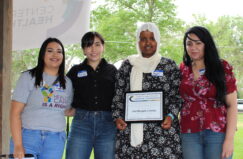
When I was 15, my mejicano family threw me a quinceañera. A quinceañera is a coming-of-age religious and cultural ceremony filled with celebratory rites and rituals. It’s typically celebrated by young women but there are quinceañeros, too. My quince took over 18 months to plan and this fiesta was intense! Quinces in my family are about as large as a wedding - there was a court of attendants, a live band, a limo ride complete with a cruise through town, the big misa (Catholic mass), and a large reception complete with a full dinner and dance for 350 guests.
As a teen, I didn’t give much thought to the cost of this party but as I’m nearing my “doble quince” (I turn 30 next month) it’s on my mind. How did my working class family with 5 kids ever afford such an extravagant party? The answer is padrinos and madrinas. There were 20 or so extra people who helped my parents pay for the party. The couple who baptised me, Adrian and Sylvia, were the padrinos del vestido (sponsors of the dress), they paid for the dress that was handmade for me in Mexico. My mom’s good friend, Gloria, was the madrina de medalla (sponsor of the religious medal). My Aunt Mirna and Uncle Isaias were padrinos del grupo, they paid for the band. Monica and Jorge were padrinos del salon, they paid for the event center at the local fairgrounds where we hosted the dinner/dance. It was a collective party!
Padrinos and madrinas are integral to most milestones in my life. They are the family members or close family friends who stand by us as we transition and achieve and celebrate. They pitch in with money and their labor and declare to the community that they have your back. I had padrinos for my baptism and even 30 years later, they still call to check in on me. I had padrinos for religious ceremonies at church, and a madrina when I graduated high school. If I ever choose to get married, I’ll need a big wedding just to accommodate all the padrinos and madrinas who have stood beside me over my lifetime. When my biological dad died suddenly, it was my padrinos, Ernie and Adrian, who really stepped up. They grieved with me and provided a shoulder to cry on. All my padrinos and madrinas continue to let me know that I am not alone. In fact, many of them called to congratulate me when I bought a house last year.
As the organizer here in Fort Morgan, I had the chance this summer to honor a number of the individuals who have helped us support our community during the pandemic. As special women in our work, I struggled with referring to them as just “members”. I wanted to acknowledge their meaningful involvement with the work. After some thought, I knew that instead of referring to them as members I would name them Center for Health Progress madrinas. They are the women whom I go to with questions and concerns. We work alongside one another, and we are each other's professional support system. I think of all our members as the padrinos and madrinas of Center for Health Progress. Some give money so the work can continue, some put in the work to build power in our communities, and some get involved in responding to community needs and drag us along with them. We all do as we’re able. That’s what community means. I’m thrilled that I can see the connection between my personal padrinos and madrinas who have helped raise me and the ways that I’m part of a madrina and padrino coalition with Center for Health Progress in service to health equity.
It may be a stretch for some folks but I hope you see your place as a madrina or padrino in our work. I hope you feel part of a larger community all pulling in the same direction to ensure greater equity for health. I hope you’ll start referring to yourself as a madrina or padrino of Center for Health Progress! Maybe I’ll throw a “doble quince” for my 30th and instead of contributing to a party, I’ll ask folks to contribute to our work!




